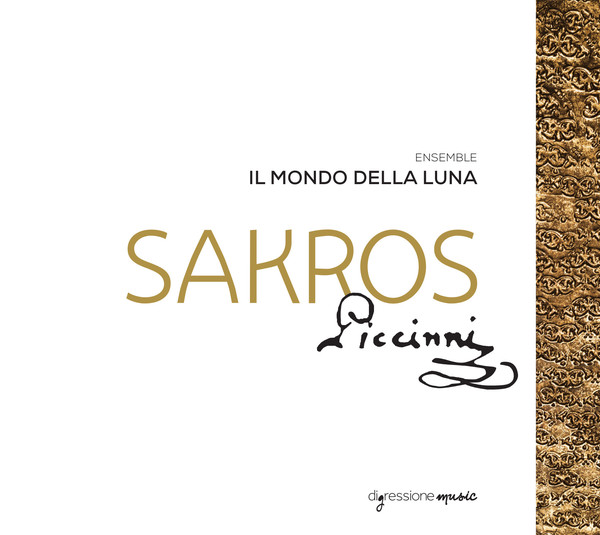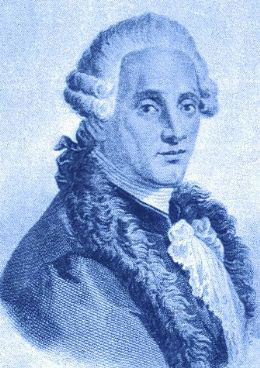
Niccolò Piccinni
Sakros
Album IT 2015 on Digressione Music label
Classical (Baroque)
Sacred Piccinni: the theatre of faith from the Credo to the Pater Noster The prayer Pater Noster is considered one of the most inspired and well-known scores of Niccolò Piccinni (Bari 1728 – Parigi 1800), a great master of the Neapolitan School, an oustanding figure and music composer of Europe during the Age of the Enlightenment. The manuscript “composed for the Queen of France and Navarre Marie Antoinette” promptly stands out: this is demonstrated by the fact that a great deal of sources have survived to the present day. Old copies of the time in their fine bindings are found in important collections of Rome, Bologna, Milan, Wien, Muenster, Moscow and Copenaghen. After a long oblivion, during the 21st century the fortune of this score seems to recommence from Apulia, Piccinni’s homeland, thanks to a first printing edited by father Anselmo Susca osb (Il Grifo edition, Bari 2000) together with Vito Paternoster (he has often conducted live performances of this work) and this very first recording conducted by Grazia Bonasia. On this occasion the source used for the performance is an elegant manuscript being preserved in Copenhagen (DK-Kk, ms. mu. 6311.1834) as appears in the noted autograph «G. Koës, Roma 1810», in the musical fund collected by the classic philologist Georg Koës during his journey in Italy. Piccinni’s Pater Noster has been passed down in rare transcriptions “per alto solo” whereas most versions, amongst those the one played here, also contemplate the soprano soloist besides strings and continuo. The long and virtuoso work which is a unique synthesis – in the typical Neapolitan manner- of both theatre and religious worship, distributes/allots the sacred text throughout different sections -though well identified- most of the time introduced by powerful orchestral episodes that set the scene for the singer wizardry technique and the intensity of the content. The same magnificent beauty is epitomised by the musical rich texture of the Trinitarian doxology represented by the Gloria Patri and the solemn final Amen. Another treasured work by Piccinni that completes this recording, is one song of the Ordinarium Missae namely the Credo for three voices with strings and continuo, whose manuscript is kept in Assisi at the Sacred Convent of St. Francis (Fondo antico, ms 303/2). The score layout is somewhat unusual in its choice to provide up to five intonations for the same verses belonging to the same silloge -all of them performed in this recording- although the arrangement of the old liturgical book is doubtless traditional (Patrem, Et incarnatus, Crucifixus, Et resurrexit). Same verses, different variations in music: alternative options written to the benefit of either potential performers-commissioners or as juvenile exercises for the training of the art of work “in modern style” and/or that of Palestrina? Amongst the pedagogical pillars of the Neapolitan school there was intonation of profane verses and mainly of religious passages in order to develop a comprehensive proficiency-based training and to be able to deal with any technical, educational, artistic and aesthetic need. This Credo might be a juvenile exercise, yet not immature, by Niccolò Piccinni; it clearly foresees the most mature Pater Noster and a deluge of masterpieces composed by a great master unfortunately still poorly recognized and performed.
Musicians
 | Niccolò Piccinni , 1728-1800 IT album by |
Album Tracks 

| No | Title | Artist | Composer | Duration | |
|---|---|---|---|---|---|
| 1 | Pater noster: Pater noster | Niccolò Piccinni | 04:56 | ||
| 2 | Pater noster: Adveniat regnum tuum | Niccolò Piccinni | 02:41 | ||
| 3 | Pater noster: Panem nostrum quotidianum | Niccolò Piccinni | 03:51 | ||
| 4 | Pater noster: Et ne nos inducas in tentationem | Niccolò Piccinni | 01:58 | ||
| 5 | Pater noster: Gloria Patri | Niccolò Piccinni | 04:08 | ||
| 6 | Pater noster: Sicut erat in principio | Niccolò Piccinni | 02:35 | ||
| 7 | Credo: Patrem Omnipotentem I | Niccolò Piccinni | 02:59 | ||
| 8 | Credo: Et Incarnatus I | Niccolò Piccinni | 00:56 | ||
| 9 | Credo: Crucifixus I | Niccolò Piccinni | 01:09 | ||
| 10 | Credo: Et Resurrexit I | Niccolò Piccinni | 02:50 | ||
| 11 | Credo: Patrem omnipotentem II | Niccolò Piccinni | 02:40 | ||
| 12 | Credo: Et Incarnatus Est II | Niccolò Piccinni | 00:46 | ||
| 13 | Credo: Crucifixus II | Niccolò Piccinni | 01:00 | ||
| 14 | Credo: Et resurrexit II | Niccolò Piccinni | 02:30 | ||
| 15 | Credo: Patrem Omnipotentem III | Niccolò Piccinni | 02:25 | ||
| 16 | Credo: Et Incarnatus Est III | Niccolò Piccinni | 01:52 | ||
| 17 | Credo: Crucifixus III | Niccolò Piccinni | 01:01 | ||
| 18 | Credo: Et resurrexit III | Niccolò Piccinni | 02:35 | ||
| 19 | Credo: Patrem omnipotentem IV | Niccolò Piccinni | 01:59 | ||
| 20 | Credo: Et Incarnatus Est IV | Niccolò Piccinni | 00:49 | ||
| 21 | Credo: Crucifixus IV | Niccolò Piccinni | 01:04 | ||
| 22 | Credo: Et Resurrexit IV | Niccolò Piccinni | 03:13 | ||
| 23 | Credo: Patrem Omnipotentem V | Niccolò Piccinni | 01:59 | ||
| 24 | Credo: Et Incarnatus Est V | Niccolò Piccinni | 00:49 | ||
| 25 | Credo: Crucifixus V | Niccolò Piccinni | 01:09 | ||
| 26 | Credo: Et Resurrexit V | Niccolò Piccinni | 03:08 | ||
| 27 | Credo: Amen | Niccolò Piccinni | 01:07 |
30sec audio samples provided by ![]()
